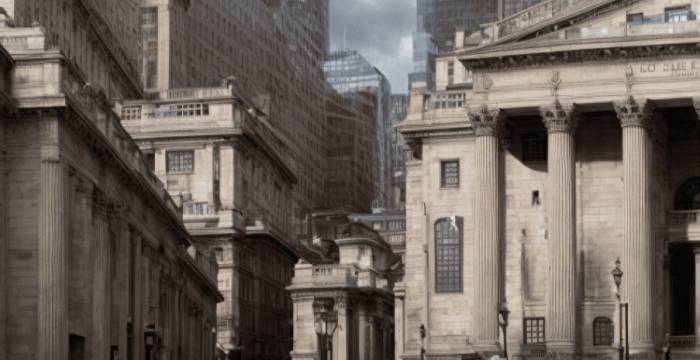UK Economy Struggles; Is the End of Interest Rate Hikes Near?
The Bank of England is expected to keep interest rates unchanged this week, but more importantly, it will provide its latest economic forecasts. Investors and economists widely anticipate that the Bank of England's Monetary Policy Committee will keep the key interest rate at 5.25% unchanged for the second consecutive time this Thursday, and the economic forecasts it provides will be more significant than its interest rate decision.
The forecasts provided by the Bank of England this week may indicate that the UK economy will go through a gloomy period in the months leading up to the next general election. After surveys and official data indicate an increased risk of recession, the Monetary Policy Committee is expected to lower its GDP forecasts for the second half of this year and 2024, and the unemployment rate may rise from the 50-year low of 3.5% reached last year to around 5% in the coming months. This will increase the likelihood of an economic downturn in the coming months.
This exacerbates the concerns of Prime Minister Sunak's government, as he must hold an election before the end of January 2025. Currently, the Conservative Party is lagging behind Labour in opinion polls and suffered a crushing defeat in recent by-elections. Sunak's efforts to cut government spending and reduce the burden on businesses, such as canceling the net-zero emissions commitment and cutting the northern section of the UK HS2 high-speed rail, have done little to improve his reputation or stimulate economic growth.
Will the UK's interest rate hikes also come to an end?
After pushing interest rates to their highest level since 2008, Bank of England Governor Andrew Bailey stated that borrowing costs will not decrease until inflation is under control. The UK's inflation problem is the most severe among the G7 countries, with price increases more than three times the 2% target.
According to swaps related to the policy meeting dates, the possibility of the Bank of England making its last 25 basis point rate hike early next year has been reduced to around 40%, and it is also expected to make two 25 basis point rate cuts by the end of 2024.

Barclays interest rate strategist Moyeen Islam wrote, "We believe there is limited scope for further rate hikes." He said that the Monetary Policy Report may indicate that policymakers are satisfied with the current level of interest rates.
Although the Bank of England may keep interest rates at 5.25% unchanged, investors still want to know which data policymakers are paying the most attention to. In September, the minutes of the meeting repeatedly mentioned the S&P Global Purchasing Managers' Index.
In addition, recent wage data was slightly stronger than expected, highlighting the risk of upward inflation. Bank of England Chief Economist Huw Pill has said that officials believe these data may be outliers, after all, the UK Office for National Statistics was forced to delay some labor market reports due to insufficient data collection.Deutsche Bank economist Sanjay Raja stated: "There are clear signs that the labor market is cooling down much faster than the Monetary Policy Committee's assumptions in August... Total wage growth and private sector wage growth are likely to have already peaked."
The economy is already struggling under the burden of interest rate hikes.
Under the influence of interest rate increases, the UK's economic growth has been held back. In the minutes of the September meeting, the Monetary Policy Committee stated that it expects "GDP to grow by only 0.1% in the third quarter of 2023, compared to the expected increase of 0.4% in the August report." Most importantly, the Bank of England's prediction in August for a potential growth rate of 0.25% per quarter in the second half of the year may also be reduced.
Most economists expect the GDP forecast for next year to be revised down from 0.5%. Many also expect the Bank of England to revise down its economic expectations for this year as well.
Nomura Securities' Chief UK and Eurozone Economist, George Buckley, said, "In terms of GDP, the short-term situation should be revised down based on the latest monthly data, and we believe the central bank will maintain a weak outlook forecast." As for the unemployment rate, he believes there is an upside risk to the Bank of England's forecast.
Economists believe that the situation may become more optimistic after next year. Panmure Gordon's Chief Economist, Simon French, pointed out that the recent upward revision of GDP for 2020 and 2021, the reduced risk of inflation expectations being higher than actual levels, and the stabilization of interest rate expectations have all "improved the medium-term economic outlook."
However, looking at more recent performance, the UK's inflation in September was 6.7%, and an increasing number of economists expect a recession in the next few quarters. This poses difficulties for the Bank of England to keep interest rates high, and political pressure from some parliamentary members has been growing, calling for the central bank to relax restrictive interest rate policies to prevent economic contraction.
High interest rates also complicate the implementation of tax cuts popular with Conservative voters by UK Chancellor Hunt, as high interest rates increase debt servicing costs and put pressure on the Treasury. Lingering inflation has a similar effect, as about a quarter of the UK's public debt is linked to inflation. Moderate growth will suppress the Treasury's tax revenue, thereby exacerbating these pressures.
Post Comment